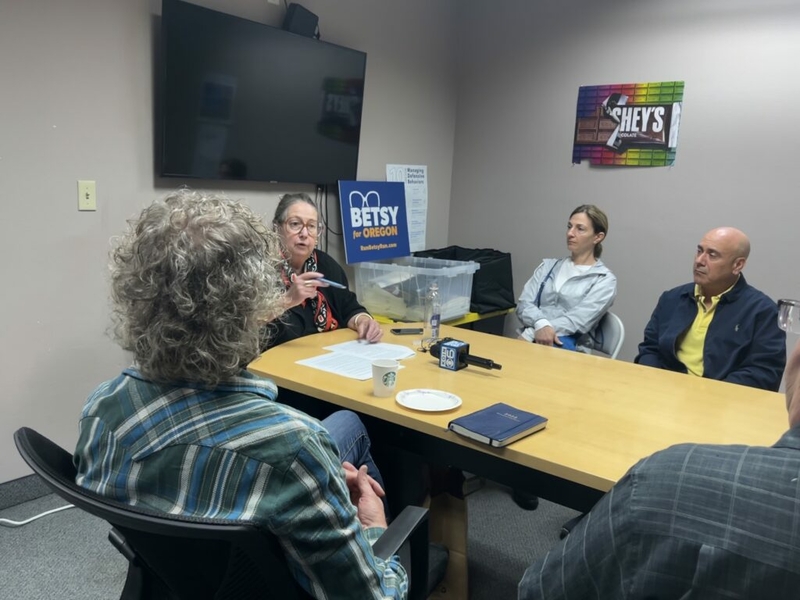Oregon governor candidate Betsy Johnson hosts crime roundtable in Portland’s Lents neighborhood

PORTLAND – At her third meeting of the morning with angry Portlanders, nonaffiliated candidate for governor Betsy Johnson explained why she sees a viable path to becoming Oregon’s first independent governor in decades, despite poll numbers.
Her day started at a restaurant vandalized the night before, then a visit to the Portland airport where she saw broken-down recreational vehicles parked all over. She invited reporters to her third meeting, in the backroom of a business in the Lents neighborhood. The owner, worried about vandalism, insisted that his business not be identified.
“All I’ve done this morning is talk to pissed-off people,” Johnson said. “Everybody’s pissed.”
Both Johnson and Republican nominee Christine Drazan have sought to make the governor’s race a referendum on crime and homelessness in Portland, the home of Democratic nominee Tina Kotek. Earlier this month, Drazan brought Maryland’s GOP governor, Larry Hogan, to downtown Portland to make the case for a Republican approach to public safety.
Polls, including one commissioned by the Oregonian last week, show Kotek and Drazan in a statistical tie, with Johnson a distant third. But Johnson told Lents residents she’s staying in the race, and that she believes she’ll prevail with the roughly 15% of voters who remain undecided, according to the recent poll.
Many undecided voters fit the same cohort, Johnson said. They’re female, educated, support abortion rights, like President Joe Biden and would never vote for a Republican. They don’t like Kotek and will view her as a safe harbor, she said.
“I still think that there’s a possibility that I can be your governor if enough people vote for me,” Johnson said.
Her campaign counts on people like Lydia Massaad, a meeting attendee who used the downtown Portland Lebanese restaurant her family owns to provide prepared meals and food boxes for Oregon’s foster youth and other hungry kids.
Massaad said her business has been vandalized, and that she has had many encounters with aggressive people living on the streets.
“They’re taking up the entire street,” she said. “They’re not homeless. They’re drug addicts. They choose to be there. But if I say this, the windows of my business in downtown Portland will be broken because I don’t have compassion.”
Another attendee, Tom Borden, described his wife’s work leading a community project to clean up and paint a pedestrian bridge in Lents. For years, he said, he liked living in a city that erred on the side of treating people with compassion.
“I’ve now realized that this is absolutely not compassionate,” he said.
Johnson said she subscribes to the broken-window theory: If a city allows visible signs of low-level crime, like broken windows and graffiti, it will encourage more crime. As governor, she said she would exert pressure on Portland’s elected leaders and the Multnomah County district attorney to prosecute crimes.
“Oregon cannot succeed if Portland fails, and Portland right now by every measure is failing,” Johnson said.
Johnson said she also would work on expanding statewide a shelter model used in the former Wapato Jail in Portland. The jail was never used, and Johnson reached out to developer Jordan Schnitzer when he purchased it to ask if he’d consider giving the kitchen equipment to Helping Hands, a nonprofit organization that helped homeless people in Tillamook County.
There wasn’t any kitchen equipment to give, but Schnitzer and the nonprofit’s head instead paired up to turn the old jail into a shelter. Johnson helped raise money for the venture and secured $2 million in legislative appropriations, and her husband serves on the board. The former jail now shelters about 300 people.
She describes it as a success, but said the project was criticized by Portland and Multnomah County leaders because it’s a high-barrier shelter – it requires people to remain sober and employed to stay, and it charges a low monthly rent.
The city of Portland has favored low-barrier shelters and harm-reduction methods of dealing with addiction that limit the negative consequences of drug use without stopping the drug use itself. That could include needle exchanges so people using intravenous drugs use sterile needles instead of sharing or reusing dirty ones, handing out fentanyl test strips and making naloxone available to reverse overdoses.








